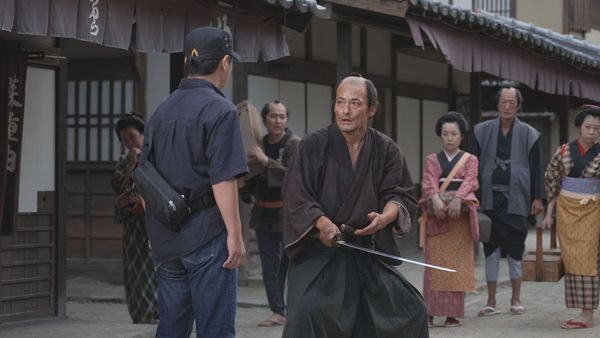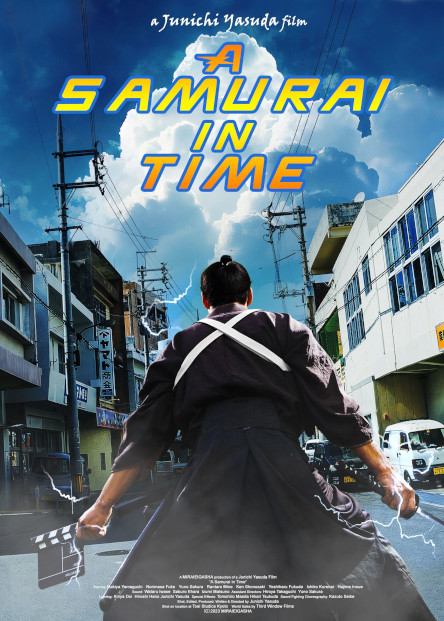Eye For Film >> Movies >> A Samurai In Time (2023) Film Review
A Samurai In Time
Reviewed by: Jennie Kermode

As Lucía Puenzo’s Electrophilia recently established, being struck by lightning can have a lot of strange effects on people. Catapulting them through time into the future is not normally on the list – but then again, with thousand of people going missing around the world every year, never to be seen again, what can we really say for sure?
Shinzaemon Kosaka (Yamaguchi Makiya) is in the middle of a late night duel with a member of a rival clan when the bolt hits him. When he wakes up, it’s broad daylight, and he’s in an unfamiliar street. There’s something odd about it that he just can’t place. Wandering around, he finds a group of people behaving in very odd ways. Though he tries to help them, he finds, to his distress, that he has caused offence. Unbeknownst to him, he has travelled 140 years through time, regaining consciousness on a film set. Screening as part of 2024’s Fantasia International Film Festival and Frightfest, Yasuda Jun’ichi’s film has an impressive pedigree which, one hopes, will help it to get the serious attention it deserves. Looking only at that central concept, viewers might otherwise be forgiven for dismissing it as yet another gimmicky comedy, and missing out on two hours of delight. Two things elevate it. One is Yasuda’s commitment to looking in depth at the culture of the Edo period, rather than just cribbing from past jidaigeki and trying to distract us with swordplay. The other is seasoned jidaigeki actor Yamaguchi’s wonderfully sensitive and sincere performance.

Anyone might imagine the excitement of time travel, but what about the reality? As he comes to recognise what has happened to him, Kosaka begins to despair. he may be able to speak the language, but the world that he knew is gone, along with al the people he ever cared about. Once a master of his craft, he feels that he has no useful skills. He doesn’t know how to support himself, let alone make himself useful. He is fortunate that at his lowest point, he returns to the only familiar place in the area: a Buddhist temple whose keepers feel a fond duty to look after him. Fortunate, too, that once he gets over his confusion about the film set, he is able to find work there – and a human connection with capable young assistant director Yuko (Sakura Yuno) which makes life feel as if it might have something to offer after all.
Though his fighting skills impress – despite needing some work to make them safe – it’s really the other aspects of Kosaka’s upbringing that serve him best. His humility and diligence impress everyone around him and make him a quick learner, whilst his experience of living in privation means that modern life is full of wonders. His delight in the way that Japan has changed and grown as a country invites viewers to look at the good things in their own lives with fresh eyes. A scene in which he breaks down upon being offered a piece of cake, learning that this is now something within the reach of anyone, is delivered with such dignity and grace that it’s heartbreaking to watch. Positioned right in the middle of the film, it deftly sets the stage for a later moment in which, with no warning, he learns about an incident at the end of the Edo period which is history to most of us but is, to him, personal and devastating.
In light of this discovery, the final part of the film takes on a darker tone, allowing Yamaguchi to show more of his range. There have of course been many films exploring the shift in values between the Edo period and today, but rarely have they felt so immediate. There is a very effective challenge presented here to those who would like to see Japan return to that way of thinking, and yet the subject is handled with the respect it deserves, acknowledging the weight of obligation placed, by those in power, upon ordinary people who were simply trying to do their best.
The film is also, of course, a tribute to the jidaigeki genre and the skills of those who have kept it alive over the decades. It offers a peek behind the scenes but doesn’t diminish the magic. There’s remarkable skill involved in playing a samurai playing an actor playing a samurai, and this applies at the directorial level too, but the film convinces at every stage. Most notably, the climactic scene in which Kosaka switches from safety-first swordplay to fighting like he means it is riveting to watch, and the emotional closeness we have been encouraged to develop makes it more thrilling and more terrifying.
With carefully honed drama, gentle comedy and a lot of heart, A Samurai In Time is enchanting to watch, and one can only hope that it gives the flagging genre a new breath of life.
Reviewed on: 31 Jul 2024















